Professional or life skills: what is more important in the IT industry today and in the future (survey results)
Last weekend, Microsoft held its 16th Imagine Cup Student Technology Competition . Along with other participants, My Circle was invited to participate in the roundtable “Employee of the Future: Who Will Employers Search for Tomorrow?”. We were asked to highlight the importance of soft skills and hard skills in the IT industry now and in the future.
To answer this question, we conducted a survey among users of "My Circle" and "Habrahabr." A total of 3,000 people participated in the survey, we visualized all the answers using infographics, and today we are happy to share the results. Warning: there will be a lot of information.

To begin with, let's see who exactly participated in the survey in order to understand the context in which we will then look at the answers. We see that we have about the same sample as in all our previous polls.
Two-thirds of our respondents are developers.
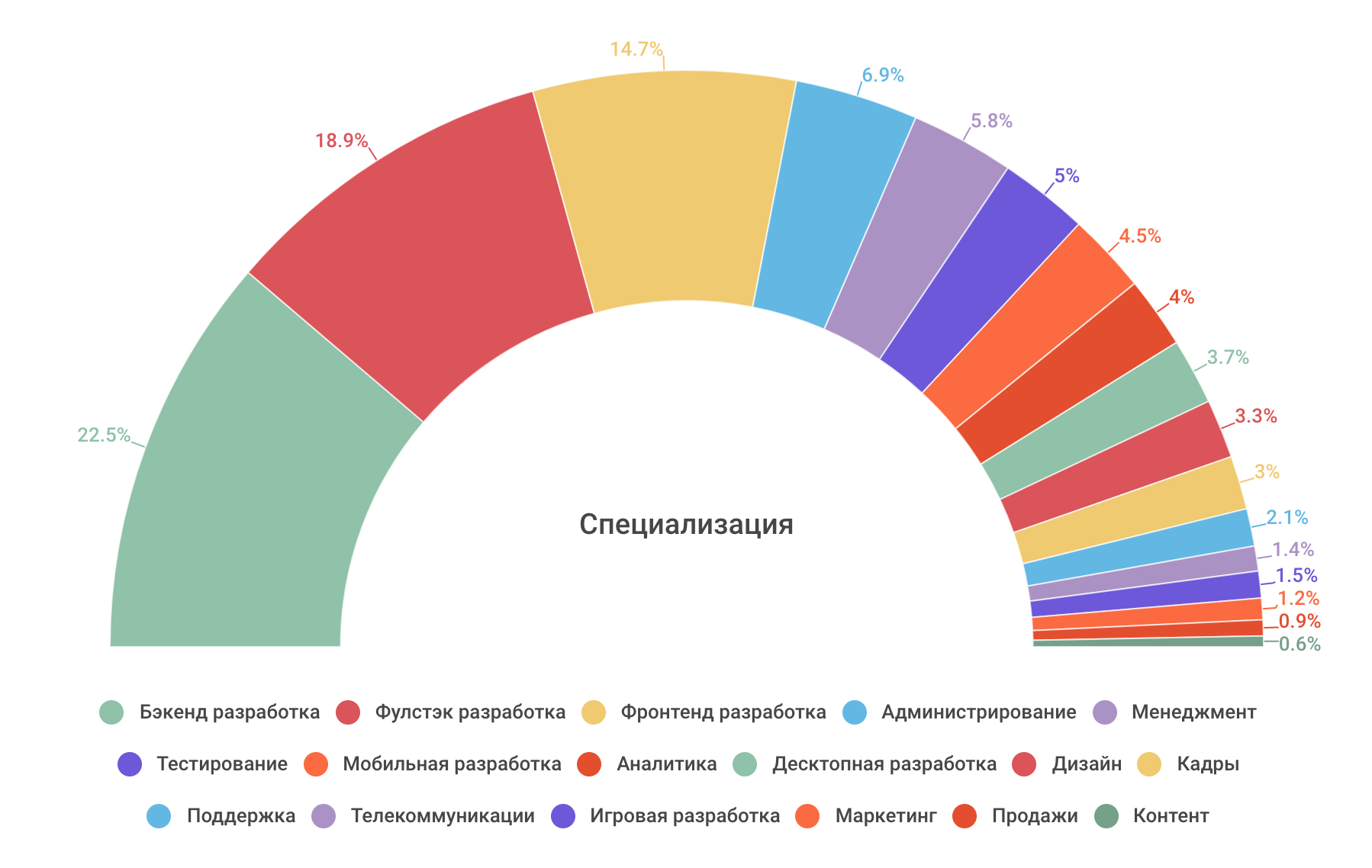
In total, there are more senior and advanced specialists than entry-level specialists and interns. The vast majority are men.
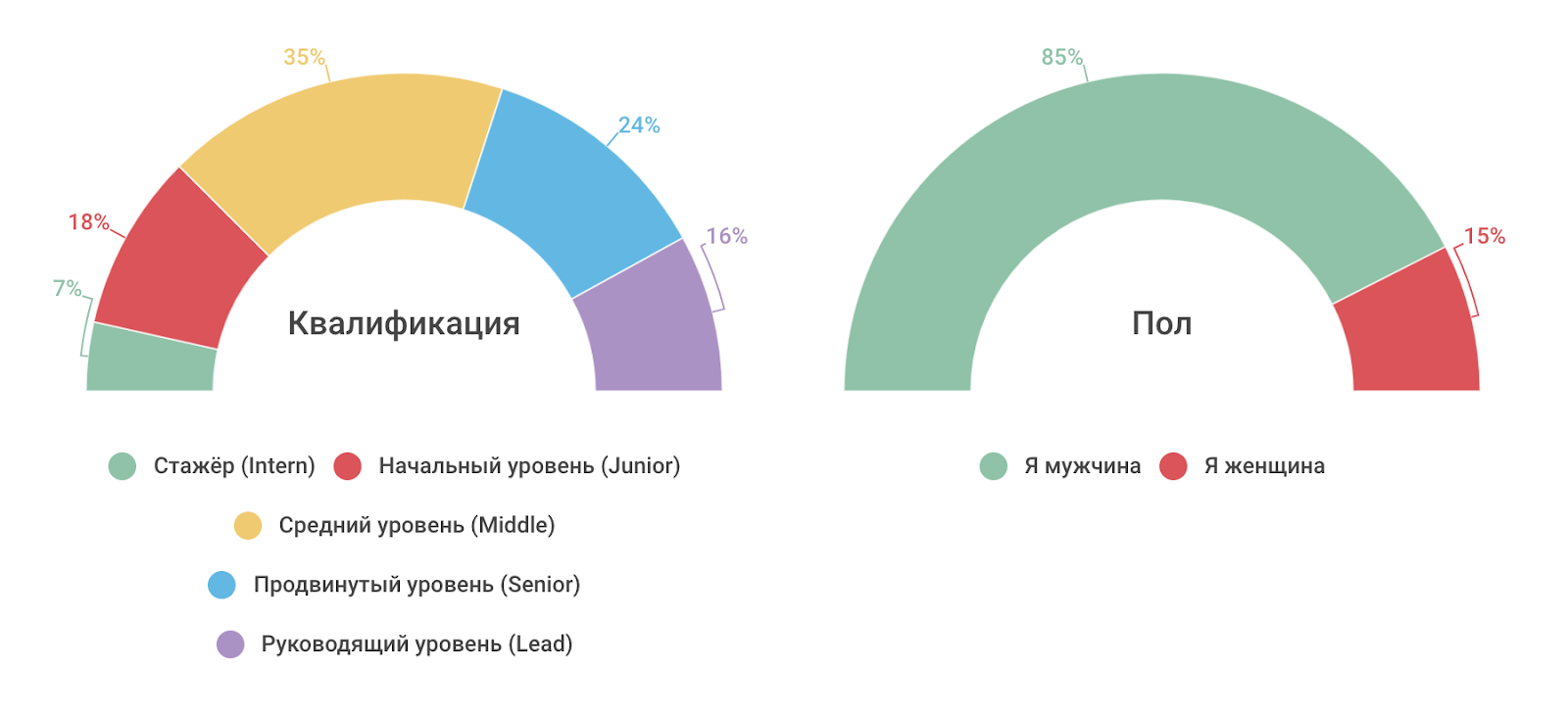
Every third of a million city, every fourth from Moscow. Most work in small private companies. One out of ten temporarily does not work.
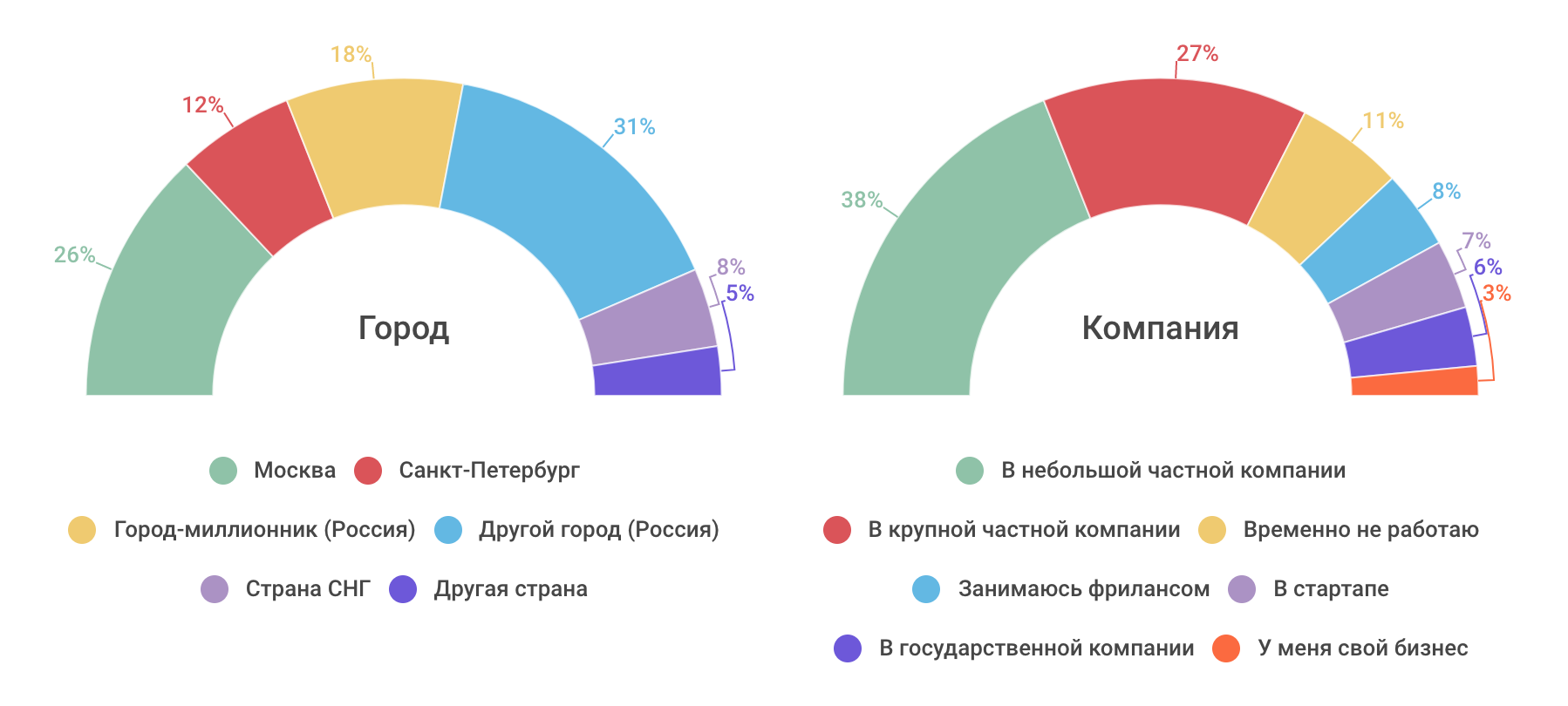
The first question we tried to find out is how much IT specialists distinguish between life skills (soft skills) and professional skills (hard skills), how much they generally think on this topic. It can be assumed that the more often people think about this difference, the greater the role life skills play in this case.
Most (70%) think about the difference between life and professional skills. Women are slightly more often than men (76% versus 69%). Most likely, this is due to the difference in the specialties in which women and men work. As we saw in previous polls , men are more focused on “technical” positions, and women are more on “humanitarian” ones.

In leadership positions, they think about the difference in skills more often than in subordinates, when entering professional life - more often than before. In startups they think more often (77%) than in other types of organizations, and in freelance - less often than all (63%).

The field in which the specialist works also leaves its mark on the greater or lesser importance of the difference in skills. Eycharas and managers distinguish skills much more often than others; maintenance specialists - less often than others.
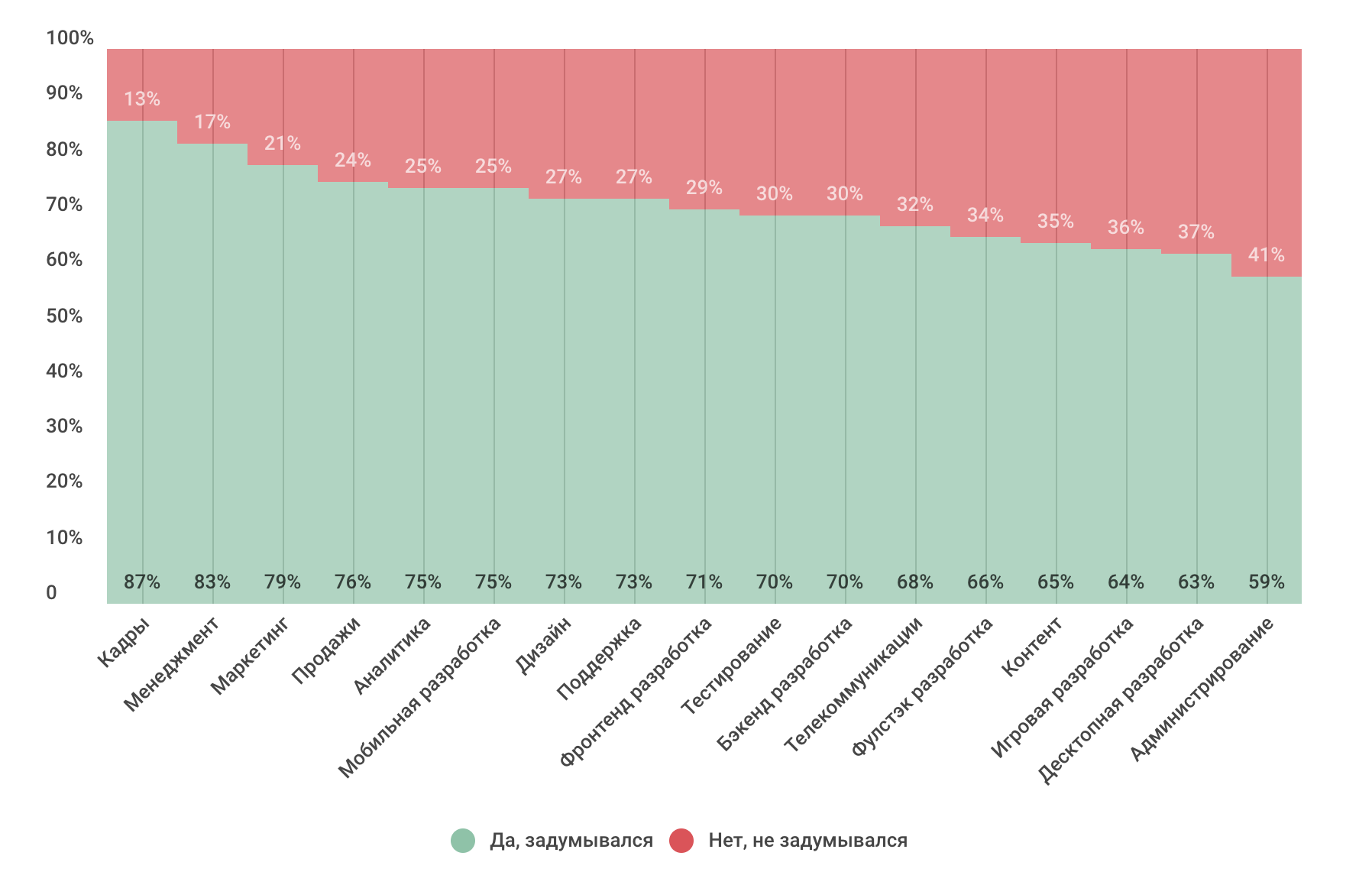
Then we decided to figure out what life skills (soft skills) are in general? Is it possible to make a list of the most important life skills for IT professionals?
Professional skills (hard skills) are those skills that can be acquired through education, which can be measured using formal tests and which are applicable in a particular profession.
Life skills (soft skills) are those skills that are formed throughout life, which are difficult to measure with formal tests and which are applicable in all professions.
Life skills are divided into three groups:
1. Communicative skills
2. Personal skills
3. Management skills
You could choose as many options as you like. More than half of the votes, with a wide margin from the rest, gathered the following communication skills: the ability to work in a team, the ability to argue, the ability to listen, the ability to negotiate and negotiate.
All these are teamwork skills, which is not surprising for our IT sector. Especially clearly this sequence of the importance of communication skills is typical for developers.
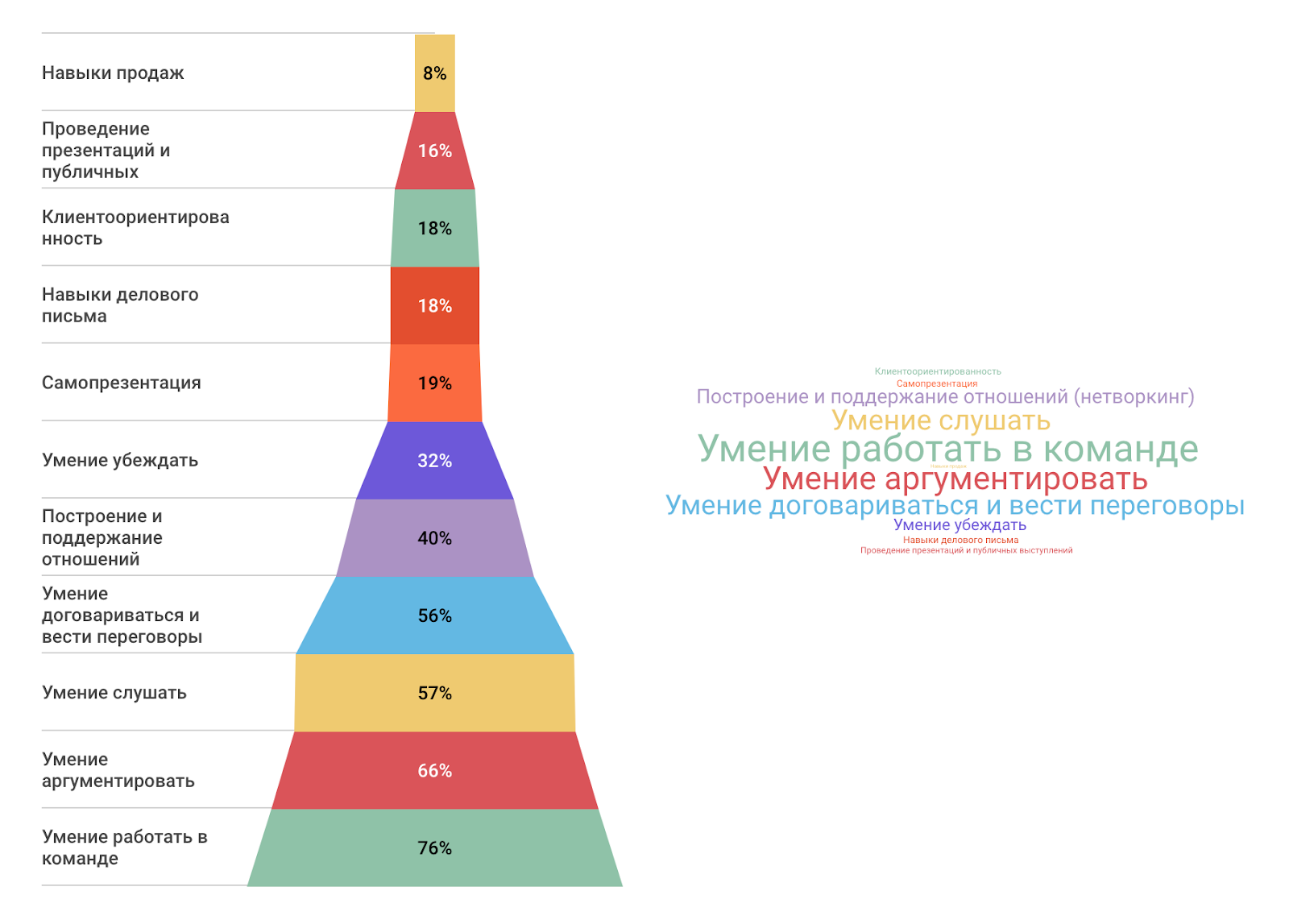
Some differences in the importance of communication skills in other areas of activity are interesting.
Unlike communication skills, there is a much greater variety of answers. Significantly more than half of all the votes gained the skill in searching and analyzing information (66%) and the skill in managing time (57%).
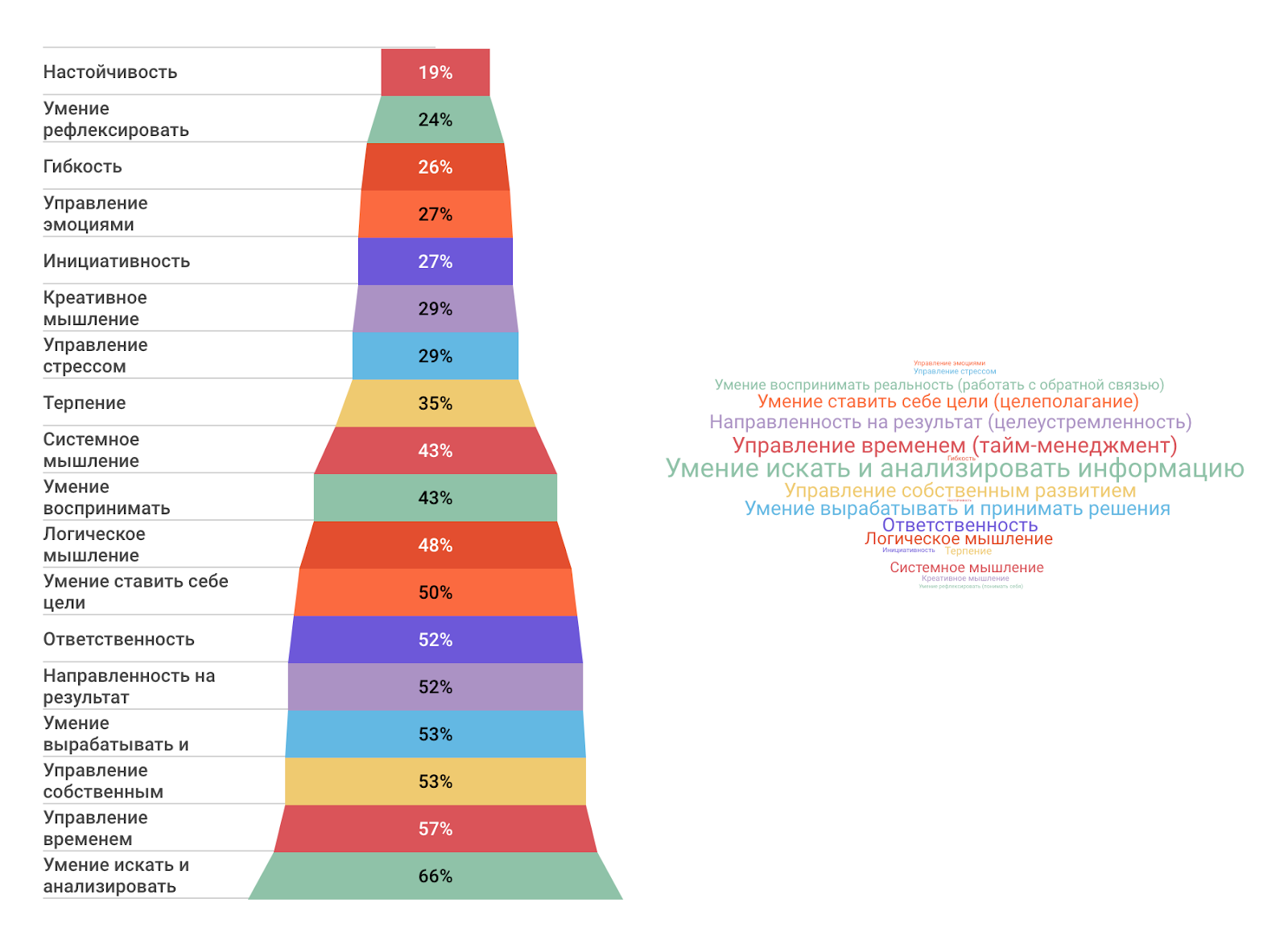
But what interesting differences from the general average were found.
In managerial skills, the leaders who scored noticeably more than half the votes turned out to be planning skills (71%).
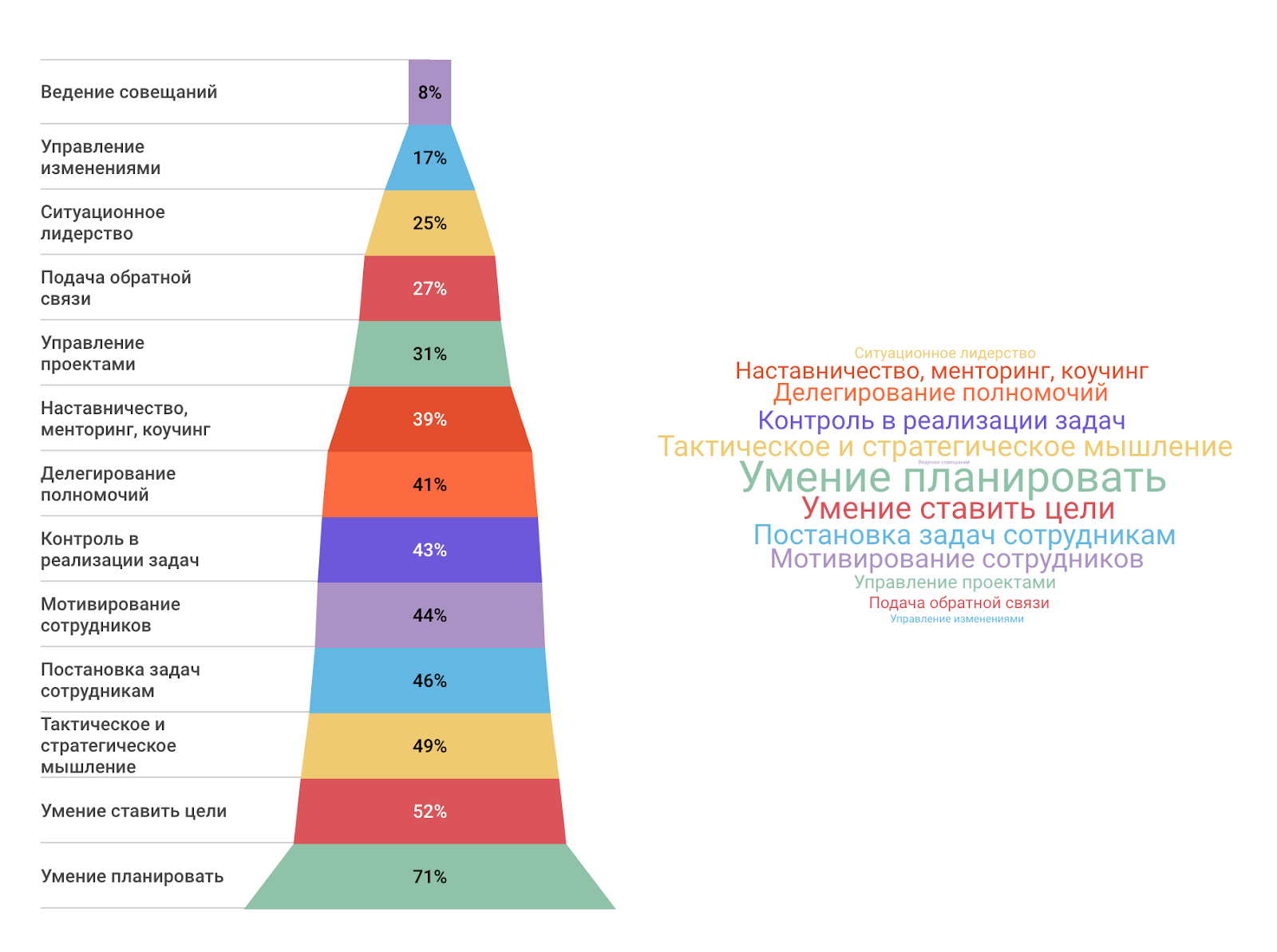
Finally, we got to the forecasts for the future!
For almost all specialties, simultaneously both types of skills, professional and life, play an important role.
A situation where a cohort that considers life skills is more important than professional ones, is more than a cohort that considers the opposite, is observed only in three specialties: sales, HR and management. This is typical for today and for expectations in the future, where analytics also joins them.
The greatest dominance of the cohort, which considers professional skills more important than life skills, is observed in mobile development, as well as in telecommunications. However, in the future, such dominance will be softened, but a similar strength in content is expected.

If we look at the dynamics of the change in the relative shares of cohorts that consider one or another skill more important (we look at the difference between percentage shares in the future and the present), we get the following interesting picture.
The growth of the relative importance of life skills is expected in almost all specialties: most of the changes in this area are expected in game development and telecommunications. And the only areas where the opposite is expected to decrease the relative importance of life skills are support and content.
An increase in the relative importance of professional skills is most expected in sales and content. Conversely, the strongest decline in the importance of these skills is expected in game development, telecommunications, and analytics.
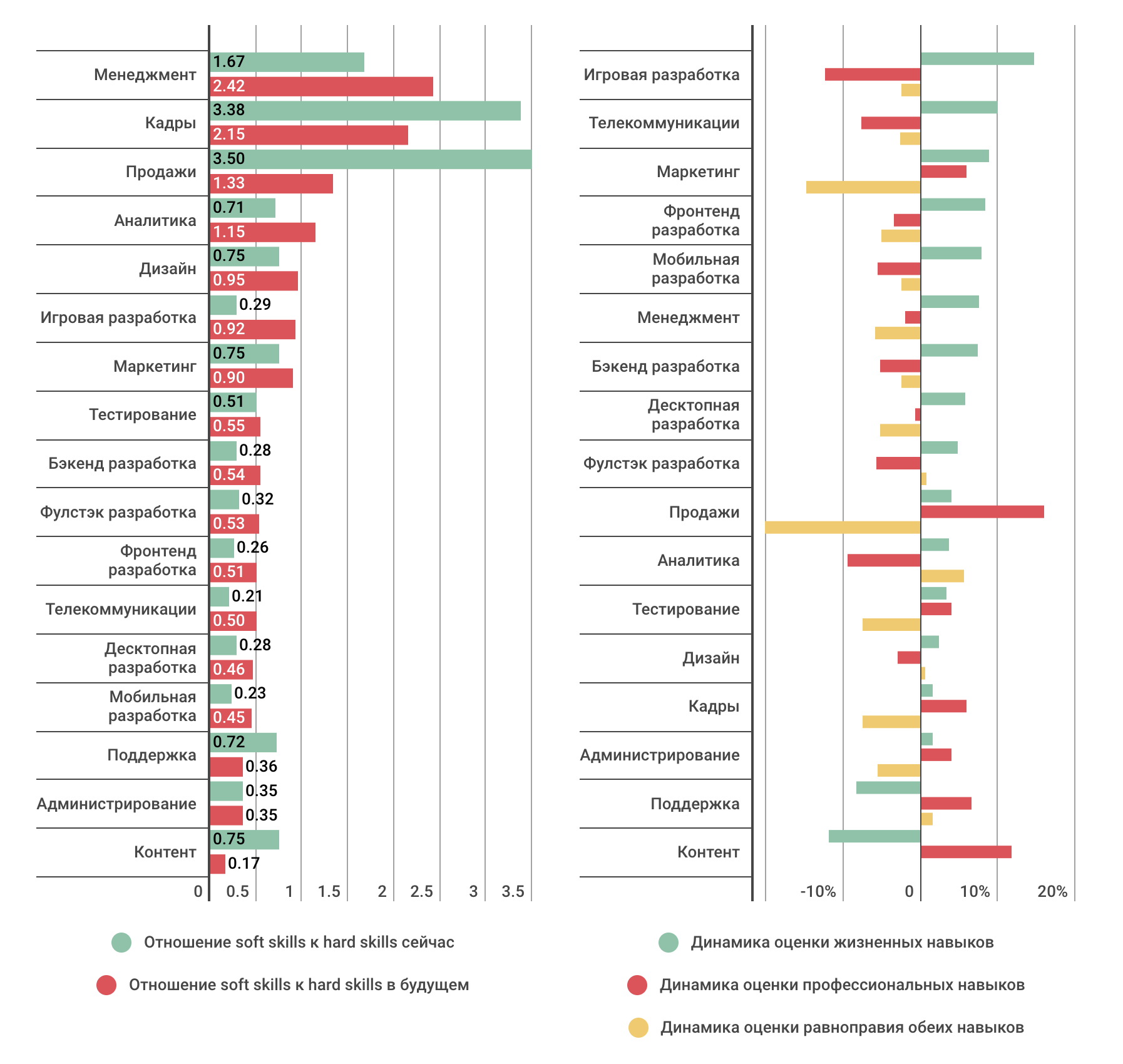
If we make a very crude generalization, then on the whole we see that technical specialties tend to “humanize”, and humanitarian specialties, on the contrary, “become technological,” sometimes with some damage to other skills.
There are a couple of exceptions to this crude conclusion. In management, there is no desire to increase the importance of professional skills, and life skills become even more important. In HR, marketing, sales, testing and administration, the importance of both of these skills is growing at the same time.
It is widely believed that a programming skill will soon become a universal skill that will be needed in almost all areas of activity. We decided to test this hypothesis, and that's what we got.
On the question of the need for programming, one could put a rating from 1 (not at all necessary) to 5 (really needed). Next, we calculated the weighted average and worked with it.
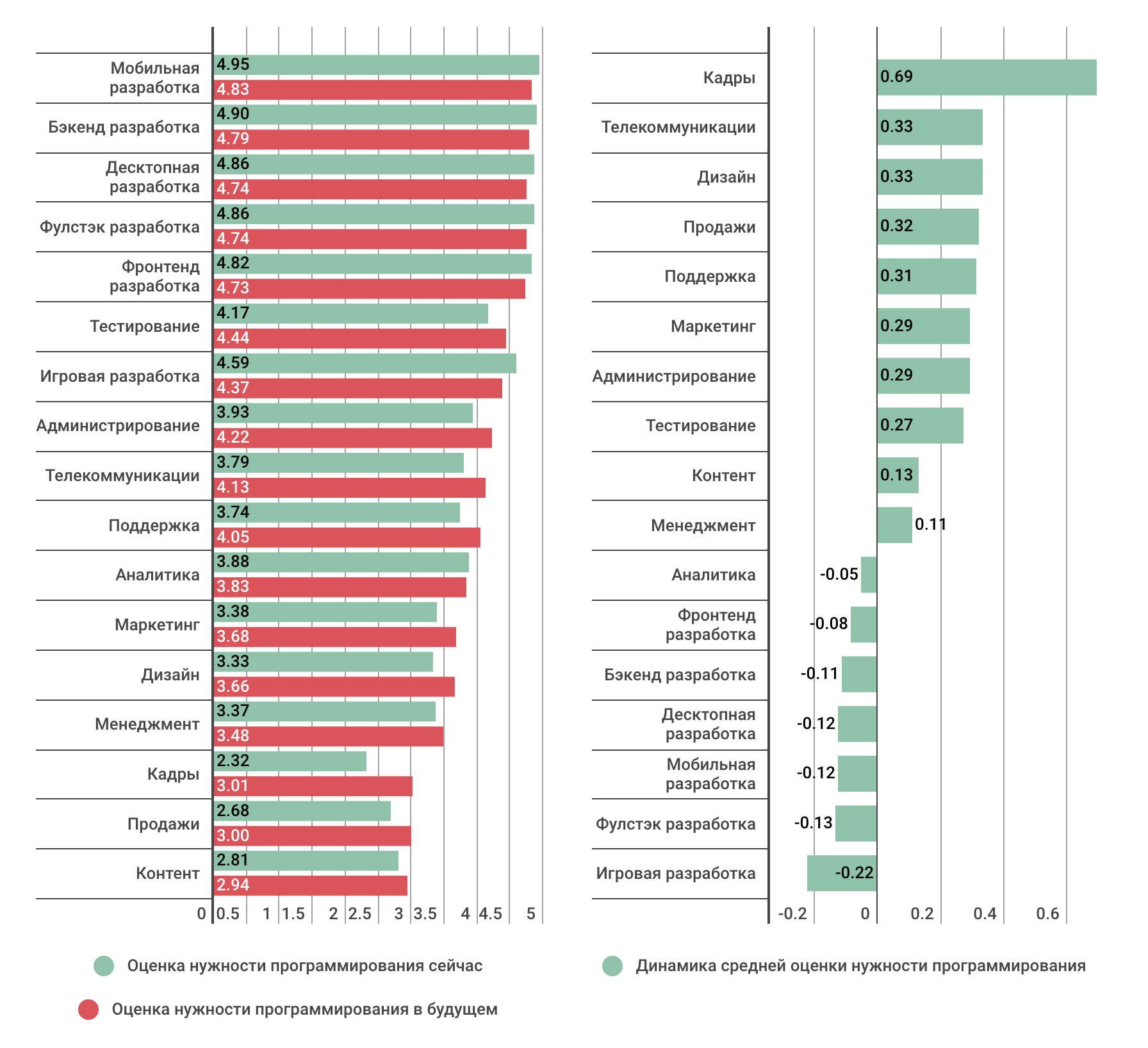
We see that among developers a slight decrease in the importance of programming skills is expected, especially especially compared to others in game development. But in all other areas of activity, it is really expected that the programming skill will become more in demand. This is especially expected in the field of eychara.
The results of this question reinforce a rough generalization from the results of the previous one: we see that technical specialties tend to slightly reduce their technological effectiveness, and humanitarian ones, on the contrary, increase it.
Let us pass from theory and forecasts to directly current practice. Let's see how life and professional skills affect hiring and layoffs.
As you can see, more than half (59%) of specialists are directly involved in the selection and evaluation of new employees, two thirds of them are interested in the candidate’s life skills.

The frequency of interest in the life skills of the applicant directly depends on what specialty he is selected for. In principle, we see about the same picture as in the survey about distinguishing between two types of skills. When selecting an HR, manager, analyst, and salesperson, life skills are almost always paid attention to: only in about 10% of cases they are not paid. When selecting developers, life skills are not paid in about 25% of cases.
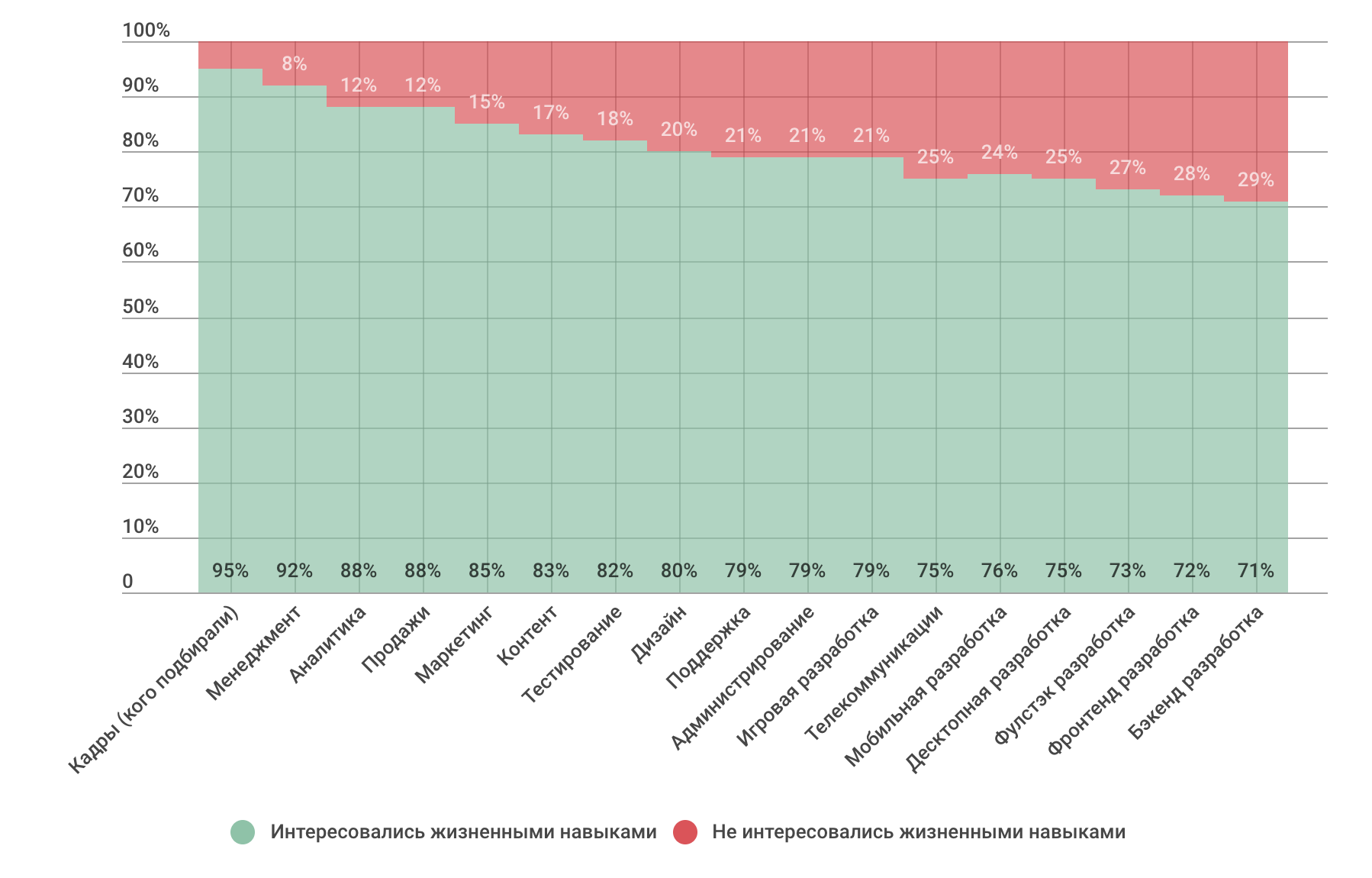
In the case when the candidates have the same professional skills, the choice is based on life skills. And again, we observe a similar picture: when evaluating the applicant in “humanitarian” specialties, this happens 2-3 times more often than in “technical” ones.
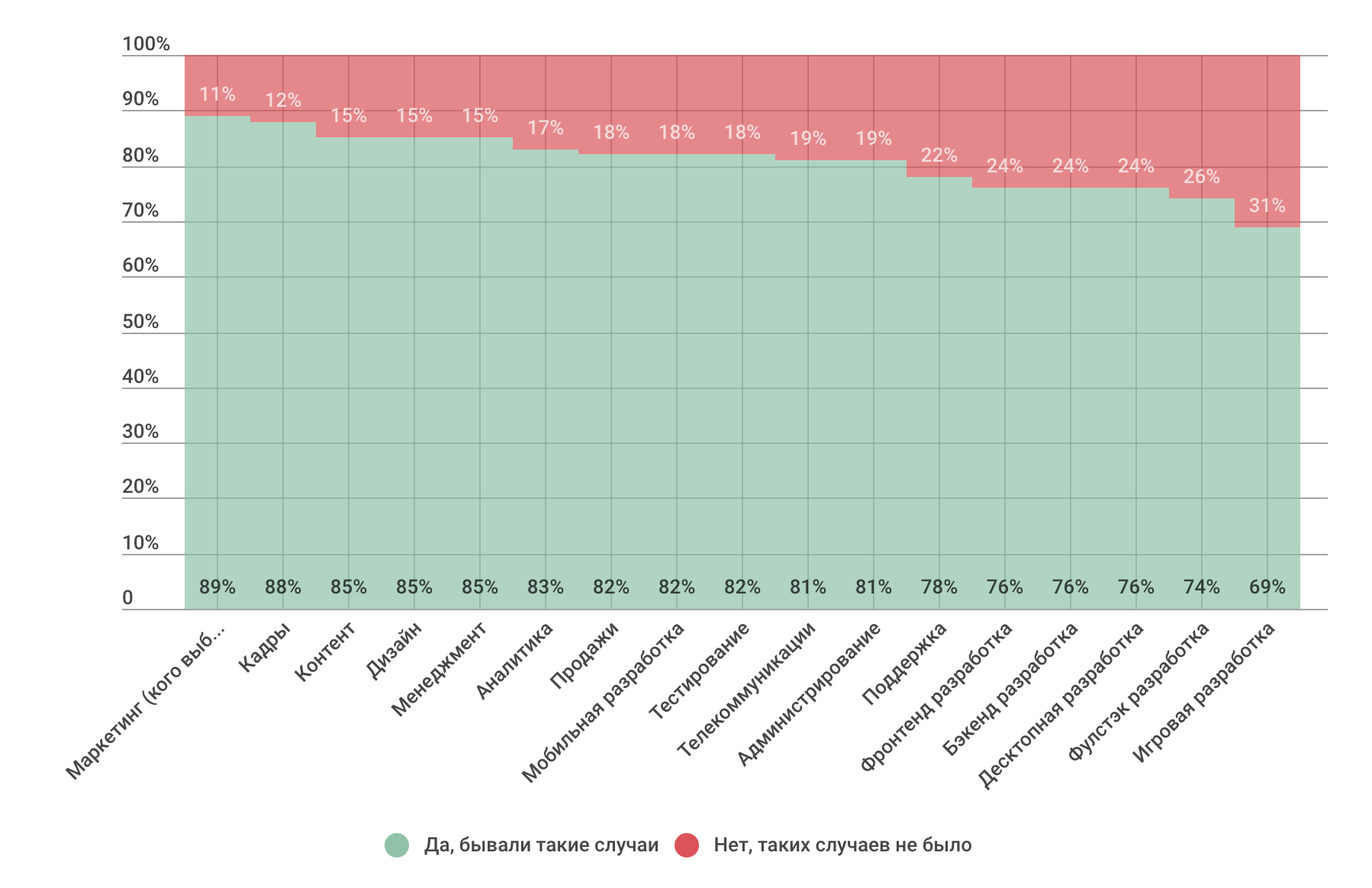
If 59% of specialists participate in the hiring process, then in the process of dismissal, 33%, which is still a pretty impressive figure. Both types of skills are equally likely to be fired.

If we decompose the reasons for dismissal by field, we will see that there is no longer such a clear picture as when hiring: the reason for dismissal due to mainly life skills does not correlate so much with the “humanitarian” nature of the person who participated in the dismissal.
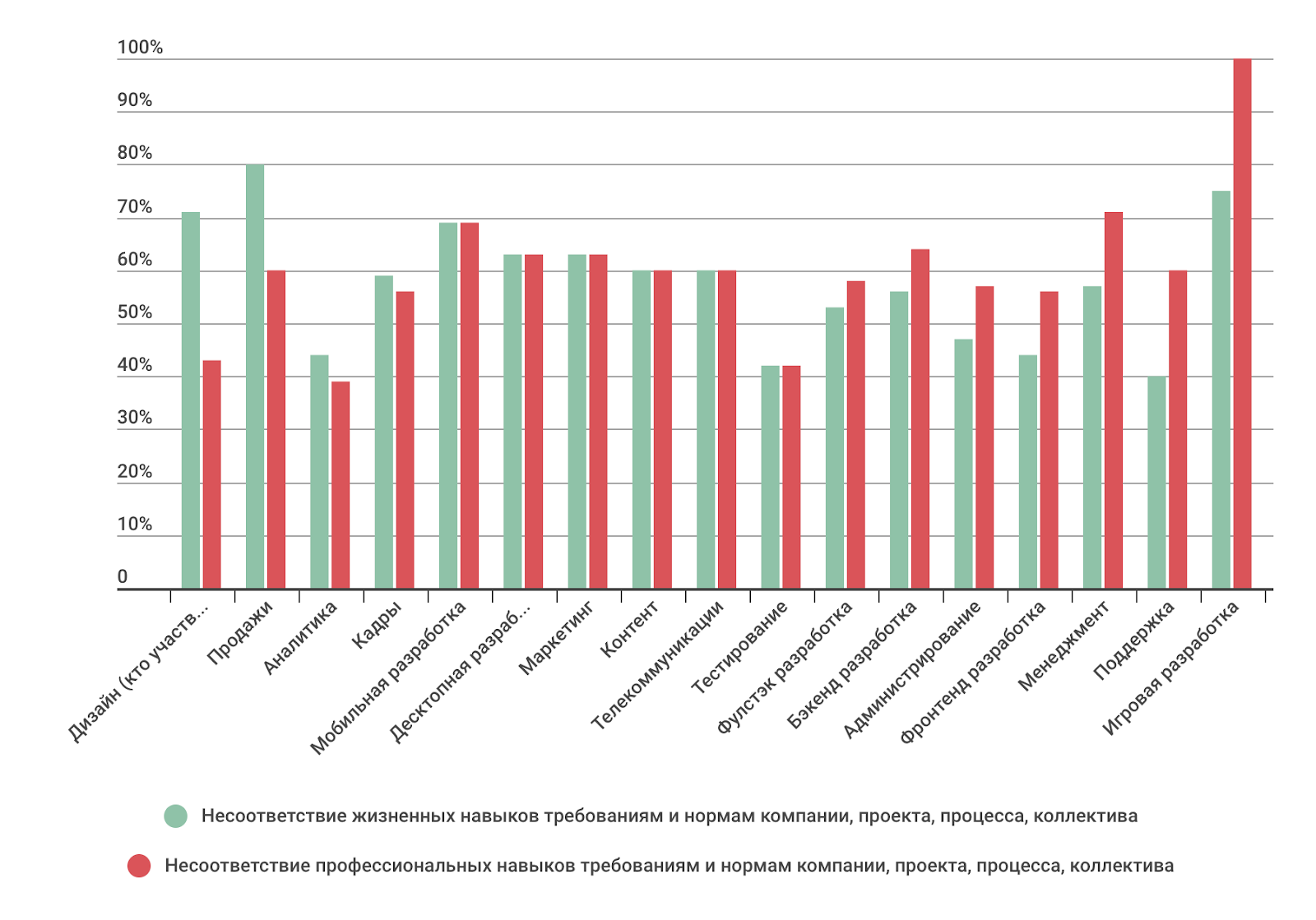


As you can see, more than half of the specialists undergo additional training in professional skills, and only a quarter do this in life skills. Most learn vocational skills in courses, and life skills on their own. Every second strengthens professional skills at conferences, and only every fourth strengthens life skills. Mentoring as a way of continuing education is equally represented there and there. Communities work a little better with professional skills.
All diagrams are prepared using the infogram.com service .
To answer this question, we conducted a survey among users of "My Circle" and "Habrahabr." A total of 3,000 people participated in the survey, we visualized all the answers using infographics, and today we are happy to share the results. Warning: there will be a lot of information.

Who participated in the survey
To begin with, let's see who exactly participated in the survey in order to understand the context in which we will then look at the answers. We see that we have about the same sample as in all our previous polls.
Two-thirds of our respondents are developers.

In total, there are more senior and advanced specialists than entry-level specialists and interns. The vast majority are men.

Every third of a million city, every fourth from Moscow. Most work in small private companies. One out of ten temporarily does not work.

Have you ever thought about the difference between hard skills and soft skills?
The first question we tried to find out is how much IT specialists distinguish between life skills (soft skills) and professional skills (hard skills), how much they generally think on this topic. It can be assumed that the more often people think about this difference, the greater the role life skills play in this case.
Most (70%) think about the difference between life and professional skills. Women are slightly more often than men (76% versus 69%). Most likely, this is due to the difference in the specialties in which women and men work. As we saw in previous polls , men are more focused on “technical” positions, and women are more on “humanitarian” ones.

In leadership positions, they think about the difference in skills more often than in subordinates, when entering professional life - more often than before. In startups they think more often (77%) than in other types of organizations, and in freelance - less often than all (63%).

The field in which the specialist works also leaves its mark on the greater or lesser importance of the difference in skills. Eycharas and managers distinguish skills much more often than others; maintenance specialists - less often than others.

What are life skills (soft skills)
Then we decided to figure out what life skills (soft skills) are in general? Is it possible to make a list of the most important life skills for IT professionals?
Professional skills (hard skills) are those skills that can be acquired through education, which can be measured using formal tests and which are applicable in a particular profession.
Life skills (soft skills) are those skills that are formed throughout life, which are difficult to measure with formal tests and which are applicable in all professions.
Life skills are divided into three groups:
1. Communicative skills
2. Personal skills
3. Management skills
What communication skills do you consider the most important in your profession?
You could choose as many options as you like. More than half of the votes, with a wide margin from the rest, gathered the following communication skills: the ability to work in a team, the ability to argue, the ability to listen, the ability to negotiate and negotiate.
All these are teamwork skills, which is not surprising for our IT sector. Especially clearly this sequence of the importance of communication skills is typical for developers.

Some differences in the importance of communication skills in other areas of activity are interesting.
- So, in management, marketing, sales, and HR, the first place is the ability to negotiate (65-80% of respondents from these areas indicated this skill as important).
- It turned out to be an equally important skill for these areas, as well as for content, the sales skill (20-30% indicated it, 44% in sales)
- For them, and also for analytics and design, the skill of presentations and public speaking also plays a significant role (25-35% indicated this skill).
- For them, with the exception of marketing, and also for testers, administrators, support and content specialists, the skill of business writing was important (25-35% indicated it).
- For support, marketing, management, sales and HR it is important to be customer- oriented (30-40% indicated this).
- For eychars, one of the most important skills is the ability to build and maintain relationships (70% indicated).
- For salespeople, the ability to work in a team indicated significantly fewer respondents than in all other areas (only 44%)
What personal skills do you consider the most important in your profession?
Unlike communication skills, there is a much greater variety of answers. Significantly more than half of all the votes gained the skill in searching and analyzing information (66%) and the skill in managing time (57%).

But what interesting differences from the general average were found.
- For mobile developers in the first place was the skill of time management , for managers - the ability to make decisions , for eycharov - the ability to work with feedback .
- For management, design and HR, a great role is played by the ability to work with feedback (57-67%).
- Creative thinking is important in marketing, design, and content (50-60% indicated this skill).
- For management, support, content and HR, the skill of managing emotions is important (37-55%).
- In support, much more than other areas plays the role of stress management skill (47% indicated).
What management skills do you consider the most important in your profession?
In managerial skills, the leaders who scored noticeably more than half the votes turned out to be planning skills (71%).

- For management, most skills scored significantly more than half of all votes.
- In the eychar, in addition to the planning skill, the skills of motivating employees and submitting feedback are also strongly expressed (more than 60% indicated).
- In sales, in a single sphere, the planning skill was far from the first place, instead there was a skill of tactical and strategic thinking .
Which skills are more important now, and which will be more important in the future in your profession?
Finally, we got to the forecasts for the future!
For almost all specialties, simultaneously both types of skills, professional and life, play an important role.
A situation where a cohort that considers life skills is more important than professional ones, is more than a cohort that considers the opposite, is observed only in three specialties: sales, HR and management. This is typical for today and for expectations in the future, where analytics also joins them.
The greatest dominance of the cohort, which considers professional skills more important than life skills, is observed in mobile development, as well as in telecommunications. However, in the future, such dominance will be softened, but a similar strength in content is expected.

If we look at the dynamics of the change in the relative shares of cohorts that consider one or another skill more important (we look at the difference between percentage shares in the future and the present), we get the following interesting picture.
The growth of the relative importance of life skills is expected in almost all specialties: most of the changes in this area are expected in game development and telecommunications. And the only areas where the opposite is expected to decrease the relative importance of life skills are support and content.
An increase in the relative importance of professional skills is most expected in sales and content. Conversely, the strongest decline in the importance of these skills is expected in game development, telecommunications, and analytics.

If we make a very crude generalization, then on the whole we see that technical specialties tend to “humanize”, and humanitarian specialties, on the contrary, “become technological,” sometimes with some damage to other skills.
There are a couple of exceptions to this crude conclusion. In management, there is no desire to increase the importance of professional skills, and life skills become even more important. In HR, marketing, sales, testing and administration, the importance of both of these skills is growing at the same time.
Do you need programming skills now and will be needed in the future in your profession?
It is widely believed that a programming skill will soon become a universal skill that will be needed in almost all areas of activity. We decided to test this hypothesis, and that's what we got.
On the question of the need for programming, one could put a rating from 1 (not at all necessary) to 5 (really needed). Next, we calculated the weighted average and worked with it.

We see that among developers a slight decrease in the importance of programming skills is expected, especially especially compared to others in game development. But in all other areas of activity, it is really expected that the programming skill will become more in demand. This is especially expected in the field of eychara.
The results of this question reinforce a rough generalization from the results of the previous one: we see that technical specialties tend to slightly reduce their technological effectiveness, and humanitarian ones, on the contrary, increase it.
Have you ever participated in the selection and evaluation of new employees, have you been interested in their soft skills?
Let us pass from theory and forecasts to directly current practice. Let's see how life and professional skills affect hiring and layoffs.
As you can see, more than half (59%) of specialists are directly involved in the selection and evaluation of new employees, two thirds of them are interested in the candidate’s life skills.

The frequency of interest in the life skills of the applicant directly depends on what specialty he is selected for. In principle, we see about the same picture as in the survey about distinguishing between two types of skills. When selecting an HR, manager, analyst, and salesperson, life skills are almost always paid attention to: only in about 10% of cases they are not paid. When selecting developers, life skills are not paid in about 25% of cases.

Have there been cases of choosing a candidate for life skills (soft skills) if professional skills (hard skills) were the same?
In the case when the candidates have the same professional skills, the choice is based on life skills. And again, we observe a similar picture: when evaluating the applicant in “humanitarian” specialties, this happens 2-3 times more often than in “technical” ones.

Have you ever participated in the forced dismissal of your colleagues? What skills were the main reason for such layoffs?
If 59% of specialists participate in the hiring process, then in the process of dismissal, 33%, which is still a pretty impressive figure. Both types of skills are equally likely to be fired.

If we decompose the reasons for dismissal by field, we will see that there is no longer such a clear picture as when hiring: the reason for dismissal due to mainly life skills does not correlate so much with the “humanitarian” nature of the person who participated in the dismissal.

Have you ever taken additional training in your hard skills, what kind of training was it?

Have you ever taken additional training in your life skills (soft skills), what kind of training was it?

As you can see, more than half of the specialists undergo additional training in professional skills, and only a quarter do this in life skills. Most learn vocational skills in courses, and life skills on their own. Every second strengthens professional skills at conferences, and only every fourth strengthens life skills. Mentoring as a way of continuing education is equally represented there and there. Communities work a little better with professional skills.
All diagrams are prepared using the infogram.com service .
